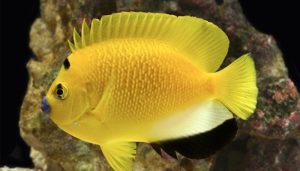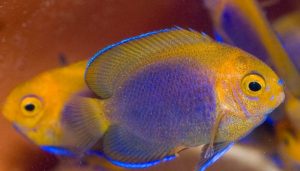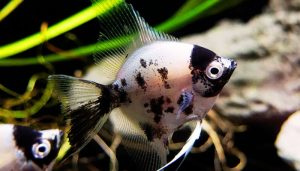Guppies are among the most admired freshwater aquarium fish for their bright colors, adaptability, and low cost. But are Guppies Aggressive? However, what many don’t know is that guppies can also become aggressive due to a variety of reasons.
This aggression can manifest in several ways, from constantly chasing other community tank mates to displays of dominance within the aquarium.
In this guppy aggression guide, we will discuss the causes for this aggression in guppies, signs to look out for, and solutions to counteract it – helping you keep your aquatic friends happy and healthy!
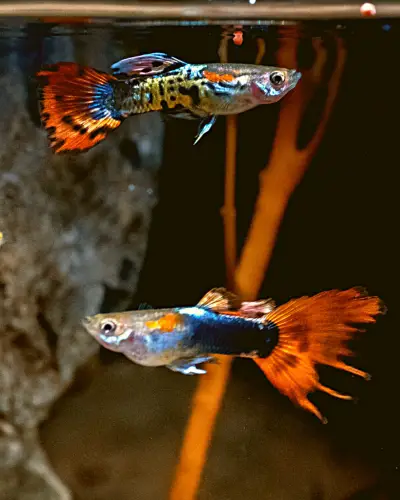
Read on to learn more about how guppies show their aggressive behavior and what steps to take if your pet displays symptoms!
Table of Contents
ToggleAre Guppies Aggressive to Each Other?
Are guppy fish aggressive? In general, guppies are not aggressive to each other. This peaceful schooling fish typically display positive interactions with one another, such as swimming together in shoals and mating rituals.
They primarily feed on small invertebrates, algae, and plants, so they don’t rely on aggression for survival. However, some guppy owners have reported more violent behavior in their tanks. This may be due to overcrowding or a need for more hiding spots for the fish to reduce stress levels.
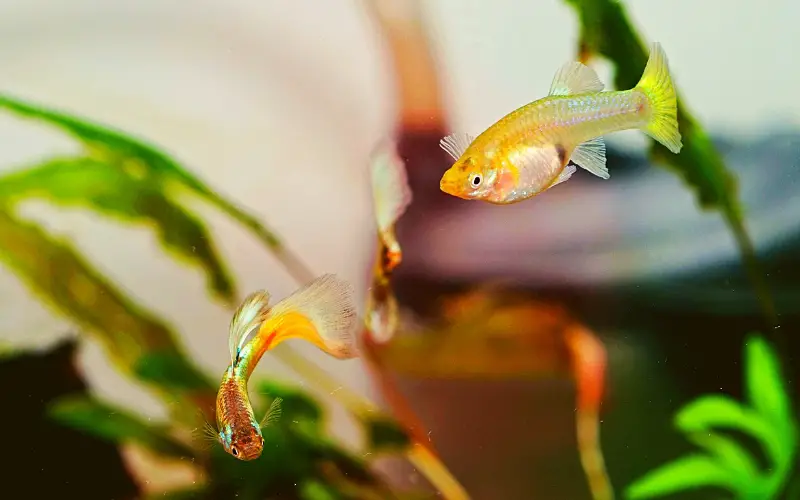
Generally, when too many males are kept together, this tends to cause aggression due to competition for mates; females usually retreat when threatened.
Therefore, aquariums must provide sufficient space and hiding spots for their fish if this potential aggression is to be avoided.
Are Guppies Fin Nippers?
No, guppies are not naturally fin nippers. Contrary to popular belief, guppies can become fin-nipping given the right circumstances, such as overcrowding and stress.
Guppies nip each other’s fins because when confined in a small space, they display aggressive behavior, which may result in them biting each other’s tails or fins, leading to injury and infection.
To ensure that your guppies stay healthy and peaceful, it’s best to provide them with plenty of room to swim around in their fish tank – at least 10 gallons per 4-5 fish is recommended – and make sure all parameters like pH, temperature, and nitrogen cycle levels are maintained at optimal levels for the species needs.
Are Guppies Aggressive with Other Fish Species?
Yes, guppies can be aggressive with other fish species. This is especially true if the tank is overcrowded or the new addition to the aquarium looks similar to a guppy in terms of body shape and coloration.
Are guppies territorial? In such cases, the territorial tendencies of these fish may cause them to become protective and hostile towards the newcomer, leading to aggression and fights.
It is, therefore, important to provide sufficient space in the tank so that each species can form its territory and ensure that any new additions are significantly different from existing fish in terms of body shape and size.
This will reduce the chances of your guppies attacking other community tank members.
What Are the Signs of Guppy Aggression
Why are my guppies attacking each other? No one has the right to keep a lookout on their tanks all the time. Also, there should be signs of a guppy attack. You can see them if you’ve been away. These are the simplest indicators of aggression in guppies:
3 Guppy Aggression Symptoms & Reasons
1 – Guppies Chasing Each Other
It’s quite unusual to see sociable fish chasing one another. This is standard mating behavior. Typically male guppies chase females all the time as they seek the right match. You can observe normal mating behavior despite seeing fewer colored fish with smaller tails.
The only difference is that constant badgering can be stressful, which may cause an unpleasant situation for the females. Female fish sometimes feel exhausted, tired, or sick and hide under a tank.
2 – Damaged And Frayed Fins
Generally, a guppy’s aggression can be detected by sagging or frayed tails. When you notice, it usually suggests the fish are being swept into the tank. Although this could be from a guppie, it could also come from another fish in your guppies tank.
Usually found in solitary nipper-like barbs or aggressive ones like gourami and betta. Typical tanks for guppies are Platypus and Neon tetras.
Lastly, this could also indicate an infection that causes fin rot. One mustn’t immediately assume a faulty fin is due to aggressive action. But it is possible.
4 – Dead Fish in the Tank
When you find a dead fish in the tank, this could be a sign of aggression. Most times, it is due to another fish picking on them. This can be especially true for weaker and smaller fish that may not be able to stand up to more aggressive fish.
It is important to monitor your guppy aggressive behavior to ensure that no fish is being picked on. It’s also important to provide adequate hiding spots in the aquarium to allow less-dominant fish to escape further aggression.
Guppies can be peaceful and pleasant additions to your tank in the right environment. However, it’s important to be aware of their potential for aggression so you can take the necessary steps to prevent it.
Reasons for Aggressive Guppies in Your Aquarium
Improper Water Conditions
In the absence of proper parameters, the fish becomes stressed and violent. It’s due to their lack of comfort in the tank. If the water was filled with excess ammonia, nitrates, or other compounds, the fish could act aggressively.
When you see fish entering the tanks, there is probably not enough oxygen inside the water. The fish tends to act aggressively in such an environment.
Competition for Mating
Guppies are very affectionate for their breeds, and sometimes aggression happens due to it. Male guppies have aggressive behavior toward other larger fish, the same as betta fish, and female men have aggressive fish attitudes toward men who harass them more often.
This can create fighting and stress on female and male guppy fish. This can be handled easily by having multiple males for each one, and they won’t be attacked.
Food Scarcity
Those who don’t have enough food will start to become aggressive and compete in food battles. Make sure to give them everything they need. All the remaining food is disposed of in the tank immediately. Get information for feeding squire.
Introduction of New Fish – New Tank Mate
Introducing fresh fish into a tank can trigger aggressive fish behavior on newly added fish. Because the new fish doesn’t understand all the other guppies, the existing guppies can try bullying the new guppie.
The aggression from guppies haltung will continue until the fish is familiar with the tankmates. Okay! Let me know what causes the female guppy fish aggression.
Aggression Patterns Between Male and Female Guppies
Guppy males tend to be the main antagonist in such aquatic warfare. Usually, when spotting smaller colored fish smacking into the middle of an encounter, it gets to the root cause. He probably started a battle because they were usually quite domineering.
Meanwhile, guppies are their dominant drab-color and triangular-shaped counterparts. They do not often display aggressive fish or are normally generous to other aquarium users.
Telling your fish apart is essential for determining the parties and the reason for the aggression. You can differentiate male guppies from females by looking at their body shape, coloration, and fin length.
How to Stop Guppy Aggression?
How to stop an aggressive guppy? Keeping aquariums can be incredibly rewarding but has its share of problems. Dealing with aggressive guppies is one of the biggest challenges for aquarium hobbyists.
Left untreated, guppy aggressive behavior will only get worse, resulting in stressed and sick fish and costly damage to plants and decorations. Here are some of the perfect ways to address and stop guppy aggression:
5 Easy Tips to Control Aggressive Guppies
Avoid Overcrowding
Guppies prefer living in crowded groups. It doesn’t make tanks stoked. Overcrowded spaces result in an inability to scuba dive. Guppies need plenty of room to swim. Avoiding overcrowding helps control aggression by guppies.
Also, you must include similar-size Guppies. If we have a big fish with little or no guppie, the big fish can attack smaller guppies. It can be avoided by adding guppies of similar sizes, less susceptible to an attack.
Guppy Male-to-Female Ratio
The ratio of male to female guppy should be one-to-three. This helps maintain the balance in the tank so that each fish has enough space to move around without any trouble. Consequently, an ideal guppy fish group includes two guppy males and 2 – 4 guppy females for optimal growth and health.
Provide Hiding Spots
Putting artificial or lifelike plants, games, or soft rocks into aquariums is also possible. They can act as hiding places for the victim, allowing the victim a place of hiding for healing.
Many hiding places give us time for aggressive behavior. In addition, smaller grebes and flies can escape the sandworms in secluded places.
Avoid male-only guppy tanks.
Guppies breeds are prolific and have great success. They’re strong in wanting mates. Therefore, male guppies fighting can be avoided by having females in the tank. In addition, the presence of female companions keeps the male guppy interested. So the two sides cannot continue to fight.
Increasing the Gallons of Water per Guppy Fish
It might be too small for guppies. Overpopulation is extremely tough because guppie populations rapidly grow. After weeks of keeping guppies, the tanks’ populations will soon be depleted. The highest proportion of guppie per gallon should be about two guppies per 2 liters of water.
The ratios represent bare minimums, and most of the tank is often overcrowded. Scarcity in crowds leads to aggressiveness.
Do Female Guppies Fight?
Are Female Guppies Aggressive? Female guppies are more peaceful, and they rarely fight each other. However, if the tank is overcrowded or when food competition arises, they can be territorial and may show aggression.
Guppies are generally peaceful fish, but certain situations, such as overcrowding or competition for food, can cause them to be territorial and aggressive. Knowing the root cause of guppy aggression is essential for addressing it effectively.
Why Is My Female Guppy Aggressive?
Female guppies usually do not display aggressive behavior, but a few conditions might cause them to be more aggressive.
Aggressive guppy female behavior is usually due to overcrowding, competition for food, and the presence of an alpha female in the tank. It is important to monitor these situations and address them accordingly.
With the hustle and bustle of life in an aquarium, pregnant female guppies often battle for more food. To ensure a safe space for this nurturers-to-be and peace among other inhabitants, adding a designated breeding tank is recommended!
Are Guppies Aggressive to Platys?
Are fancy guppies aggressive toward platy fish? Generally speaking, guppies are not aggressive to platys. However, male guppies may become increasingly territorial when looking for a mate as mating season approaches. This means that they might chase the platyfish to mate with them.
Thankfully, the behavior is usually harmless and short-lived – once the mating season has passed, typically, so does their aggression towards other fish.
Are Male Guppies Aggressive to Other Fish?
Aggressive guppy male behavior is typically limited to male-on-male combat and chasing female guppies. Male guppies rarely display aggression toward other fish besides their species.
However, they may become aggressive toward other fish in the tank if they feel threatened. This is why having enough hiding spots and plenty of space in the tank for your guppy’s aggressive fish is important.
When it comes to mating, male guppies can be surprisingly aggressive. While such behavior is understandable – who doesn’t want their harem? – having too many guppy males and not enough females in an aquarium creates problems.
To keep the peace between your fishy inhabitants, experts suggest a ratio of three female guppies for every male—which should prevent most aggression before it even starts!
Why Are My Male Guppies Chasing Each Other?
Why are my guppies chasing each other? Male guppies often chase each other for two main reasons: territorial behavior and courtship. When male guppies establish their territories in an aquarium, they become aggressive toward other males.
This is their way of defending the area from intruders. If too many guppy fish are in a small space or the tank is overcrowded, this behavior may be more pronounced as the males compete for limited resources and territory to survive.
Another reason male guppies may be chasing each other is to attract females ready to mate.
During mating season, dominant males gather several female guppies into one area where they can exert control over them. They proceed with courtship displays such as chasing, swimming around them rapidly, and flaring out their fins.
FAQs
Are cobra guppies aggressive?
Cobra guppies are known for their aggression towards other males, especially during breeding season. They can also be aggressive towards other fish, especially smaller or slower species.
Do guppies attack each other?
Yes, guppies can attack each other, especially males competing for females or territory. Aggression is more common during breeding season and can involve fin nipping, chasing, and even biting.
Why do guppies nipping each other?
Why are my guppies nipping at each other? Guppies haltung nip for dominance, breeding, or stress. Males chase each other, females can be territorial, and overcrowding creates tension.
How many guppies in a 5 gallon tank?
For a healthy environment, aim for 3 male guppies in a 5-gallon tank. Females multiply quickly, so males keep the bioload manageable.
Conclusion
So, Why are my guppies chasing each other, are Guppies Aggressive fish? Ultimately, guppies can sometimes become aggressive due to territorial behavior or aggression related to feeding. Identifying whether the aggression is a territorial issue or because of overfeeding is essential for determining how to solve the problem best. Dividing the tank into separate territories is a good solution if it’s a territorial issue. If it is due to overfeeding, reducing the amount of food and supplementing with natural sources such as live insects may assist in stabilizing their aggression levels.
It is also crucial to inspect water parameters—poor living conditions can contribute to guppy aggression too. While most individuals consider freshwater aquariums with fish such as guppies enjoyable, understanding potential issues surrounding them will help ensure long-term success. Always monitor your tanks carefully and address potential issues immediately; proactive management can help you keep healthy and happy guppies!
You might also like
- Are Guppies Schooling Fish? Let’s Clear Up All the Confusion
- Will Different Types of Guppies School Together? (Solved)
- How Many Guppies in a 10 Gallon Tank: (An Exclusive Guide)
- How Often Should You Feed Your Guppies: 9 Tips to Keep Guppy Healthy
- Will Different Types of Guppies Breed? (An Exclusive Guide)
- How Many Guppies in a 20 Gallon Tank? (Must-Read)
- 3 Proven Ways to Stop Aggressive Guppy Fish in Their Tracks
- How Long Can Guppy Fish Go Without Food: (Solved & Explained)
- Fin Rot on Guppy 101: Causes, Symptoms & Quick Treatment!
- Guppy Fin Rot or Nipping: 3 Key Differences You Should Know!
- The Ideal Guppy Male and Female Ratio: A Comprehensive Guide


